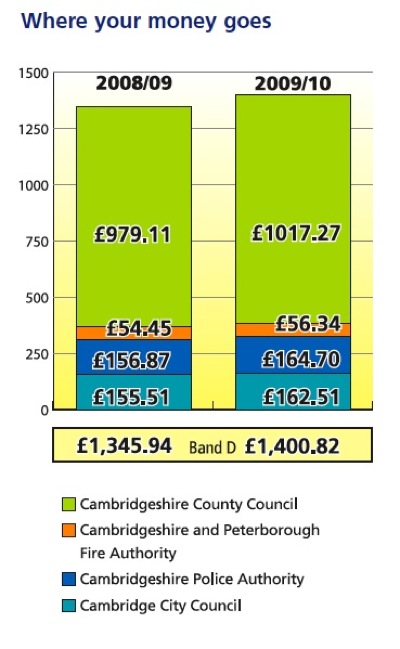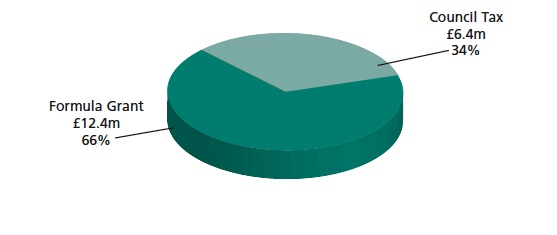
I have just written to Cambridge City Council’s web-team and the major party leaders on the City Council:
Dear Cambridge City Council Web Team,
I would like to suggest that Cambridge City Council does more to make the 2009/10 “Council Tax Leaflet”, which is available from the County Council website, accessible to Cambridge residents via the City Council website. This could be done either by hosting a copy of the document, or providing a link to it on the County Council site at:
http://www.cambridgeshire.gov.uk/council/finance/tax/Taxleaflets.htm
This leaflet explains how the council tax, which people pay to Cambridge City Council, is spent. Many electors in Cambridge don’t get sent the leaflet such as:
- Students
- Those living in properties classified as HMOs by the Local Government Finance Act where the landlord is liable for council tax.
- Those living in shared houses not classified as HMOs, but where the council (illegally in my view) deems the landlord liable for council tax.
In the latter two categories individuals pay council tax but are not informed how it is spent. I think it is important this information is made easily accessible to all Cambridge residents. (These people are also disenfranchised when it comes to many related consultations eg. that run on the level of the policing precept). In Cambridge I estimate this affects around a quarter of the electorate. It is not just those who pay council tax directly who get a say in the way the councils run and who need to be informed about the council’s spending.
There are regulations which set out what has to be included in the document and how it has to be distributed. That there is no statutory requirement for council tax collecting authorities to place the information in the council tax leaflet online is in my view a serious deficiency in the law. Despite this many local authorities do place their council tax leaflets on their websites.
The city has a very high level of population turnover and making the document available online would ensure it is accessible those residents who arrived after distribution for the year. I expect those wishing to refer to it later in the year may find it easier to find it again online that to remember where they filed it (if they kept it at all). I was looking for an electronic copy of this leaflet recently, and would have found it much quicker had it been available on, or via the City Council website. As it is the City Council which collects the council tax, it is the City Council which I look to for details of how it is spent.
I have been campaigning for over two years to get this leaflet published online. (Leader of the Council Ian Nimmo-Smith blamed problems with rights to photographs for the failure to put the 2008/9 document online when I questioned him about this at the June 2008 North Area Committee ). It is fantastic to see that the whole document has now been placed online by someone – The County Council. (The Fire Authority publish pages relating to them online, but not the whole document).
I think if Cambridge City Council either linked to, or hosted a copy of the document, on its website it would help those trying to find information on the council’s finances and what the council does with the Council Tax is collects. The finance information on the council’s webpages links straight to the annual report and statement of accounts; which have their place but the council tax leaflet is, by design, a significantly more accessible and easier to read document. As well as the council’s finance pages, the council’s “About Council Tax” page would be another location from which a link to the document would I believe be of benefit.
On a related point the council has removed its “financial publications archive” from the web. In order to assist those trying to make sense of the council’s current financial documents I suggest this page be re-instated.
—
Richard Taylor
Cambridge
Cambridge City Council Income
Breakdown of Council Tax Vs Government Grant

The key pie-chart showing the contribution council tax makes to Cambridge City Council’s income fails to show how much other revenue is generated locally, from commercial property rates, housing rents, commercial rents, and other council activities. Much of this money is pushed round in circles – to central government and back – which adds to the complexity of local government finance.
7 responses to “Where Council Tax Goes”
Cllr Lewis Herbert, Leader of the Labour Group on the City Council, has replied to me expressing support for my lobbying on making clear information on how public money is spent easily accessible.
Dear Richard Taylor
As far the Cambridge City Council’s website is concerned, the document you require is linked from the ‘Budget Process’ page ( http://www.cambridge.gov.uk/ccm/content/council-and-democracy/how-the-council-works/council-finance/budget-process.en ) as
http://www.cambridge.gov.uk/public/docs/Council%20Tax%20leaflet.pdf. I believe it has been there since its publication in March 2009. The archive of financial material seems alive and well at http://www.cambridge.gov.uk/ccm/content/council-and-democracy/how-the-council-works/council-finance/archived-financial-publications.en
Thank you for your encouragement and interest.
Best wishes
Ian Nimmo-Smith
It is reassuring that having been first elected in 1990 Ian Nimmo-Smith has acquired the experience required to navigate the depths of the City Council website and find such hidden gems.
I was clearly wrong to state: I “would have found it much quicker had it been available on, or via the City Council website”.
So once again you are attacking the Lib Dems by accusing them of something that turns out not to be true. This is getting to be a bit of a habit.
I’m sorry for the somewhat intemperate tone of that last comment; it’s easy to be much more abrupt in blog comments than you would be in person, and I let my annoyance get the better of me. Yes, you’re quite right that it could be easier to find the link on the city council website.
I think this is a bit of a problem on the City Council website in general. Whilst I’ve sometimes stumbled upon the file I need using the interface, more often I have to rely upon Google to get me where I need to go, or just can’t find anything. And that’s aside from the fairly frequent problems with broken links.
It strikes me that the City Council website is the sort of problem calling out for citizen involvement to make it clearer and more user-friendly. There are enough open government specialists and veterans of the computer industry that you could easily convene a pretty good working group on these issues.
Richard, have you considered trying to get together such an organisation? Whilst I imagine the council wouldn’t look terribly favourably on it and it isn’t enough of a hot button issue to spark that much interest, I wouldn’t think that the introductory steps would be that difficult and certain council members would likely support it.
Failing that, a variation on the excellent FixMyStreet application (very well done for that, by the way, it’s enormously useful and I look forward to giving that a go) sending automatic emails to the council whenever a bit of documentation can’t be found might be useful for hurrying them up.
The council discuss their website in council meetings I observe from time to time. Councillors generally appear to think its pretty good – which is a major part of the problem. The like the copy on the site so much they want the new re-launched Cambridge-Matters to adopt its style (The City Council leader has taken on responsibility for the magazine which will no-longer focus on recycling).
There are already groups working on improving services in Local Government. I volunteer for mySociety and through that discuss all sorts ways the internet could be better used improve people’s interactions with local and national government. I also follow what Cambridge residents Dave Briggs and Paul Canning are up to, both of whom are working on transforming the way local government uses the web.
UKGovCamp 2010 is the kind of group Edward is suggesting – though its not focused on Cambridge:
http://ukgc.wikispaces.com/
Back to the local matter – one big problem the Cambridge City Council has is that it can’t attract web-staff. It has had no leadership in its web department for a couple of years now; it has been offering people the job but they’re not taking it up.
The problem is that without a passion for openness and engagement from the elected councillors change won’t be driven. We’ve got full council resolutions not being acted on by officers and Lib Dems not grasping the reigns of power.